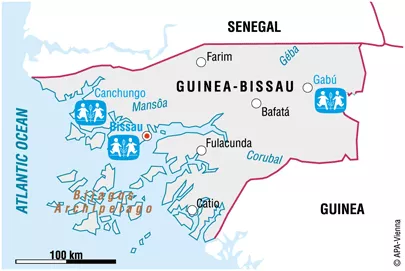SOS relies on the kindness and generosity of Canadians to be able to provide a home for the most vulnerable children around the world.
By becoming a child sponsor you are helping an individual child in need.
(You will receive a Canadian charitable tax receipt)
Please help us ensure a loving home for every child. Sponsor a child in Africa now.
SOS Children's Villages in Canchungo
Canchungo is located in the Cacheu region (northern part of the country), about 75 km from the state capital of Bissau.
With approximately 37,000 inhabitants, it is the third most important urban centre in Guinea/Bissau. The population in this region is composed of several ethnicities living together peacefully. This makes the region very diverse and wealthy in social and cultural terms.
The predominant group are the Manjaco. Large areas of the Cacheu region consist of swamps where rice is cultivated during the rainy season. Rice cultivation, subsistence agriculture and fishing are the main local economic activities. Canchungo has only one bank. A post office and telephone service is working most of the time.

The health situation in the Cacheu region is very bad since the only existing hospital with 110 beds is in poor condition. Severe malnutrition, diseases like Malaria, diarrhoea and respiratory diseases as well as the HIV/Aids pandemic have aggravated the health situation in this region. Only 23 % of the population have access to drinking water and 22.5 % to basic sanitation.
In Canchungo, the existing 45 schools cannot meet the demand for education, and the quality of schools is rather poor. Many children, especially girls, either do not attend school at all, or are forced to drop out and get married very early or to find a means of earning money such as running a small business. Kindergartens are non-existent and this is a major problem for working mothers.
In Canchungo, 18.6 % of the children do not live with their biological parents, and those orphaned or semi-orphaned represent 13.2 % of all children between 0 - 14 years of age. Only 28.4 % of the children are legally registered and have a birth certificate. Finally, 37.7 % of the children are working for their own or their families' livelihood (child labour rate).
SOS Children's Village Canchungo consists of 12 family houses, a village director's house, guest house, aunt house (SOS aunts take care of the children when SOS mothers are absent), an administration and service block, a multi-purpose hall, a gatehouse, a laundry, a house for the power generator, and an African hut for gatherings and cultural activities.
Since the water supply of the people living next to the SOS Children's Village was also insufficient, a well was built on the premises of the SOS Children's Village which is connected to the public water supply system. Thus, hundreds of people enjoy drinking water on a daily basis.
The SOS Kindergarten consists of four group rooms which accommodate 120 children. The SOS Hermann Gmeiner School (primary school) offers an education to 420 pupils. It comprises six classrooms, a multi-purpose hall and an administration and service area.
SOS Social Centre Canchungo (family strengthening, community support) includes scholarship for children, medical support, training schools support, food supplement, shelter and hygiene improvement, psycho-social support, support in getting birth certificates, child advocacy, micro credits, health issues and nutrition lectures. It has a capacity of 670 beneficiaries.
Our Impact
Image

The SOS Kindergarten in Guinea-Bissau are a fundamental building block for the early development needs including, intellectual and social skills for children. |
1 KINDERGARTENS | 52 Kindergarten students |
Image

SOS Social Centres in Guinea-Bissau aim is to help families, in particular women and children, living in communities neighbouring the SOS Children's Villages to gradually escape from poverty, and to help young people become self-reliant. |
1 SOCIAL CENTRES | 120 Beneficiaries |
Image
The SOS Children's Village in Guinea-Bissau provides loving homes to orphaned and abandoned children |
1 VILLAGES | 108 Orphaned and Abandoned Children |
Our Impact


